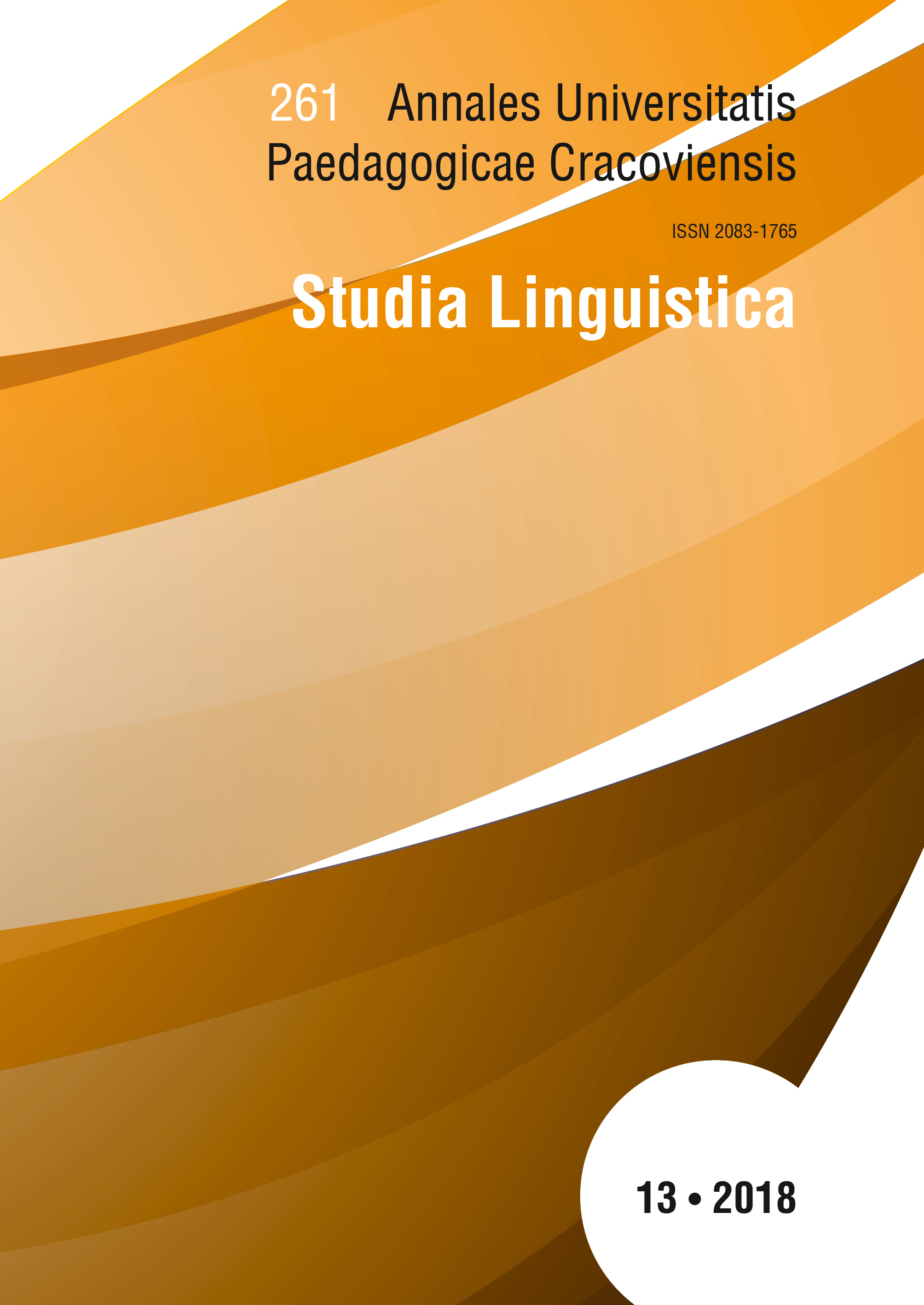Conventional quasi-religious interjections with the component Bóg [God], Jezus [Jesus], Matka Boska [Mother of God] etc. in writings by Władysław Orkan
Main Article Content
Abstract
The article is firmly rooted in the studies of religious language. The subject matter are secondary interjections incorporating words such as “Bóg”, “Jezus”, “Matka Boska”, gleaned from three W. Orkan’s novels: Komornicy [Landless Peasants], W roztokach [In the mountain dales] and Pomór [The Pestilence] as well as from his collected novellas and dramatic works. All exclamations may be divided into three groups: 1. those that function solely as interjections; 2. Those that function as both interjections and forms of address; 3. those that occur solely as forms of address. In addition to well-known linguistic units, the article analyses expressive phrases which are hitherto unmentioned in scholarly works and those which are only found in dialects.
Downloads
Article Details
Author, submitting a text to the editorial board of the journal “Annales Universitatis Paedagogicae Cracoviensis. Studia Linguistica", certifies that the content of the article has not been published so far and that the work does not violate in any way the copyright or related rights of other person, as well as other rights of third parties, and that no one's rights to the work (or any part thereof) have been missed. After signing the contract, the property rights to the published materials are transferred to the Scientific Publisher of the University of the National Education Commission, Krakow.
“Annales Universitatis Paedagogicae Cracoviensis. Studia Linguistica” is an open access journal, and all its content is made available free of charge to users and institutions under the Creative Commons CC-BY-NC-ND 4.0 license (attribution, non-commercial use, no derivative works). Under this license, the authors agree that their work may be lawfully reused for any purpose, except for commercial purposes, without the prior consent of the author or publisher. Everyone can read, download, copy, print, distribute and process these works, provided that the author's marking and the original publication place are correct. Published texts may not be used to create derivative works (e.g. to translate and publish in another language without the consent of the publisher). This is in line with the BOAI (Budapest Open Access Initiative) definition. "Studia Linguistica" does not charge for submitting or processing articles.
References
Burszta W.J., 1991, Mowa magiczna jako przejaw synkretyzmu kultury, [w:] Język a Kultura, t. 4: Funkcje języka i wypowiedzi, red. J. Bartmiński, R. Grzegorczykowa, Wrocław: Wiedza o Kulturze, s. 93–104.
Google Scholar
Engelking A., 1991, Rytuały słowne w kulturze ludowej. Próba klasyfikacji, [w:] Język a Kultura, t. 4: Funkcje języka i wypowiedzi, red. J. Bartmiński, R. Grzegorczykowa, Wrocław: Wiedza o Kulturze, s. 75–85.
Google Scholar
Grzegorczykowa R., 2001, O specyficznych funkcjach wypowiedzi religijnych, „Etnolingwistyka” 13, s. 77–84.
Google Scholar
Kobylińska J., 1997, Świat językowy Władysława Orkana. Słowa i stereotypy, Kraków.
Google Scholar
Kobylińska J., 2001, Słownik gwary gorczańskiej (zagórzańskiej), Kraków.
Google Scholar
Stomma L., 1986, Antropologia kultury wsi polskiej XIX wieku, Warszawa.
Google Scholar
Wierzbicka A., 1996, Między modlitwą a przekleństwem: O Jezu! i podobne wyrażenia na tle porównawczym, „Etnolingwistyka” 8, s. 25–37.
Google Scholar
Zaleski J., 1963, Rozwój form wołacza żeńskich rzeczowników osobowych typu Marysia, Anulka, paniusia, „Onomastica” 8, s. 261–291.
Google Scholar
Zaleski J., 1970a, Mianownik w funkcji wołacza u rzeczowników męskich, Sprawozdania z posiedzeń Oddziału PAN w Krakowie, s. 507–509.
Google Scholar
Zaleski J., 1970b, „Panie majster, proszę waści...”, czyli mianownik w funkcji wołacza u rzeczowników męskich, „Rocznik Naukowo-Dydaktyczny WSP w Krakowie 18. Prace Językoznawcze”, t. I, s. 133–143.
Google Scholar
